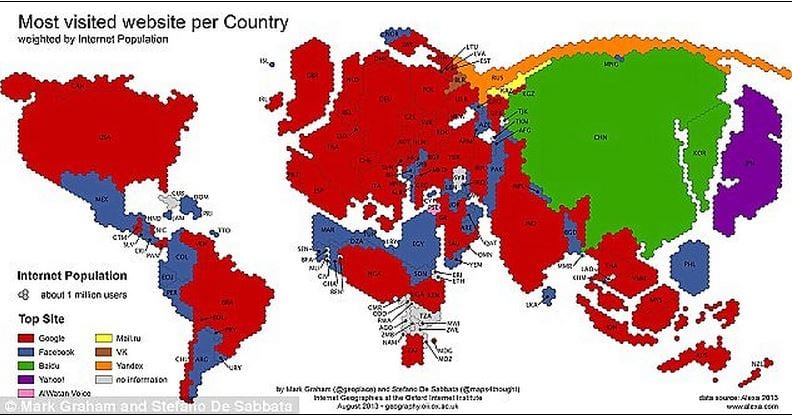The Oxford Internet Institute world usage map shows the dominance of google. We’d all be shocked to see our online profiles. Google makes Orwell’s Big Brother look simplistic. Like digital exclusion, no one talks enough about data protection and it’s probably too late. The damage is done. The Oxford Internet Institute’s Cultures of the Internet report suggests more than half of British people use the Internet ‘without enthusiasm’. They go online because they have to rather than choose to, reporting problems with privacy, frustration and time wastage with a decrease in the usage of social networking sites.
A government with Digital First policy and practice should take notice. Multiple public and private agendas drive us online yet an Office of National Statistics (ONS) report shows over 7 million people have no internet and 16 million lack the skills and confidence for effective use. Digital exclusion has many levels from disconnection to disinterest. The primary issue with exclusion is it’s inherently invisible. Exclusion from digital platforms for discussion and debate makes you voiceless. Powerless. The silence is increasing. Research data is consistent. The ONS say of the 7.1 million people offline, the elderly and disabled are least likely to be connected with 3.7 million adults with a disability having no internet access. Barriers to access for users of assistive technology remain highest of all. Yet society has the technology. The latest SCOPE report Enabling Technology shows what is possible, but government enthusiasm and allocation of resources to make it happen are invisible too. Google domination is not complete but for all the wrong reasons.
The Cultures of the Internet press release contains the worrying suggestion digital exclusion is self imposed. ‘In the past, academics studying the internet tended to focus on the digital divide, examining why certain people did not go online: whether it was to do with choice or lack of access. This study shows that a small percentage of the population (18%) still have not used the internet and it suggests that most non-users have made the choice that it is not for them.’
Within the report (page 22) this disturbing direction is partially countered with the statement ‘While disabilities…are a continuing source of digital exclusion, over half (51%) of people with a disability use the Internet. This is a rise of 11 percentage points from 2011 (from 40% to 51%). Unfortunately, 51% is still considerably less than the 84% of non-disabled respondents who use the Internet, leaving a major digital divide for the disabled.’ [my emphasis]
There are mixed messages here which fail to recognise the diversity of the category ‘disabled’. They fail to pull out the specific issues of inaccessible internet design which cannot be interpreted by a screen reader or navigated by a non-mouse user. The category ‘disability’ lumps sensory, physical and cognitive impairment together with no acknowledgement of the range of different access issues individuals face through costs and learning curves of assistive technologies as well as poor online practice which discriminates against anyone operating outside a narrow range of access criteria i.e. the ME Model. Mouse. Eyes.
Cultures of the Internet makes interesting reading. We should take time to pay attention to the consequences of the shift to online ways of working. It isn’t being paranoid to highlight the social effects of a digital society, most of all the varying patterns of exclusion and engagement. If the higher education curriculum included critical reflection on internet implications rather than unquestioningly accepting changing digital cultures, it would be a start. If ‘digital’ graduate attributes were an expectation this would increase awareness of the social consequences of digital exclusion. Without this awareness attitudes which suggest it’s a life style choice rather than an act of discrimination will continue to be replicated and reinforced.
